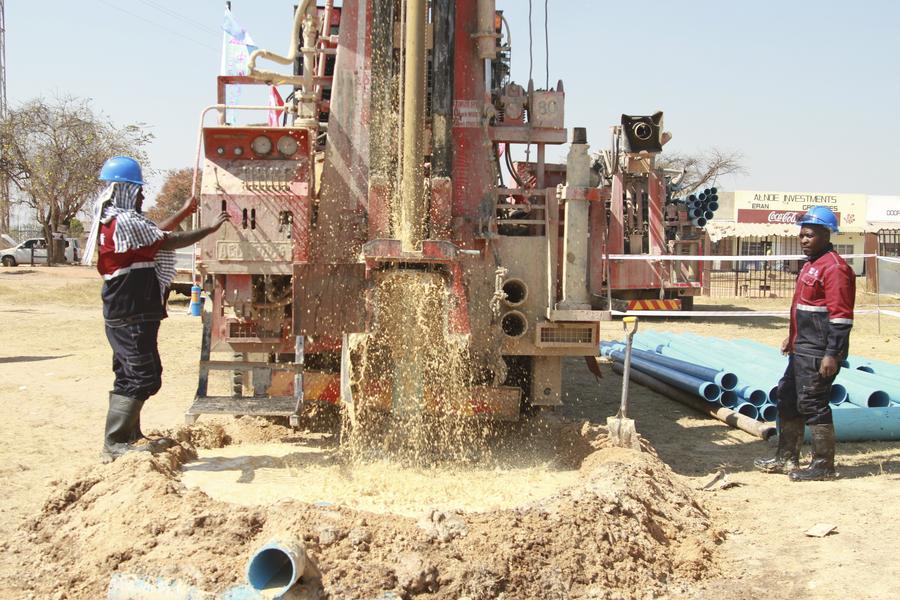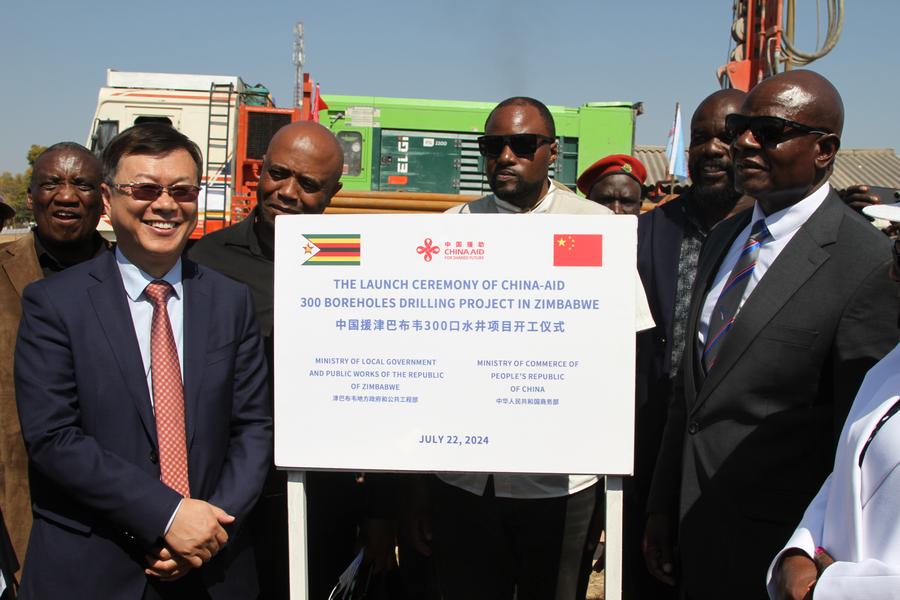(Hello Africa) China-aided borehole drilling program nourishes Zimbabwean villagers

Workers drill a borehole at the launch ceremony of a China-aided borehole drilling project in Mahusekwa, a town in Mashonaland East Province, Zimbabwe, July 22, 2024. (Photo by Tafara Mugwara/Xinhua)
China-aided borehole drilling project not only provide Zimbabwean villagers safe water, but also help Zimbabwe mitigate the effects of an El Nino-induced drought and climate change impacts.
HARARE, Aug. 3 (Xinhua) -- Excitement filled the air as water gushed for the first time from a borehole being drilled at a business center in Mahusekwa, a township in Mashonaland East Province of Zimbabwe.
The public water point is part of a program to sink 300 boreholes across four provinces, launched last month with aid from China to help Zimbabwe mitigate the effects of an El Nino-induced drought and climate change impacts.
Before the borehole was sunk, some villagers had to trek long distances in search of water, said Titha Chainga, a local villager witnessing the drilling. "We are very happy because we now have access to clean and safe water. Previously, we depended on unprotected wells and rivers, but now we have safe water."
Spiwe Chakanyuka, another villager, expressed her joy at witnessing the drilling. "We are grateful to our friends from China; they are the best and have done us a great service."
Tatenda Chimbwanda, a vegetable vendor, recounted her daily struggle carrying a 20-liter bucket of water to spray on her produce to keep it fresh. "We are grateful for the availability of water. It was difficult to maintain hygiene because of water scarcity; even toilets could not function."
The initiative followed Zimbabwean President Emmerson Mnangagwa's declaration of a state of disaster on March 3 due to the drought. El Nino caused prolonged dry spells and reduced rainfall, leading to water shortages and crop failures, impacting public health and food security.
According to the 2023 Zimbabwe Vulnerability Assessment Committee Report, 35 percent of rural households faced inadequate water services, while 45 percent traveled more than half a kilometer to fetch water.
Minister of National Housing and Social Amenities Daniel Garwe emphasized the profound impact of the borehole drilling program on affected communities in Mashonaland East, Manicaland, Masvingo, and Midlands provinces.
"The China-aided borehole drilling project is a symbol of cooperation, compassion, and unwavering support from our all-weather friend the People's Republic of China, to ensure access to safe water for all Zimbabweans," the minister said.

Chinese Ambassador to Zimbabwe Zhou Ding poses for photos with Zimbabwean officials at the launch ceremony of a China-aided borehole drilling project in Mahusekwa, a town in Mashonaland East Province, Zimbabwe, July 22, 2024. (Photo by Tafara Mugwara/Xinhua)
These boreholes will not only provide safe water but also enhance resilience against the current El Nino-induced drought, saving the lives of livestock, he added.
Three provinces benefitting from the program were severely affected by Cyclone Idai in 2019, which destroyed water supply systems, sanitation, and healthcare facilities in eastern Zimbabwe.
Over the past years, China has actively assisted in alleviating water challenges in Zimbabwe. Since 2012, China has drilled over 1,000 boreholes across 10 provinces, benefiting approximately 400,000 people.
Lobunkosi Malila, a community leader in Lumene village, Matabeleland South Province, highlighted the transformation brought by a borehole drilled under the China-aided program.
Previously, villagers shared water with livestock from a pond or dug shallow wells in riverbeds. The situation was dire, but now it has improved, she said.
"So far we haven't had any diarrhea cases because we are now getting clean water, no one has been to the hospital. We always have safe water. Prior to the drilling of the borehole, we could only get one bucket per household," she added.
She emphasized that water availability has also brought relief to women who previously spent valuable time fetching water. Additionally, it will promote local agricultural development and improve household health and nutrition.
At the Senondo Primary School in Gwanda District in Matabeleland South Province, a borehole now provides water to over 1,600 students, supporting plans for a nutrition garden and orchard.
Beyond water provision, the borehole projects have created jobs for local youth trained as technicians to maintain the boreholes, further benefiting the community.


